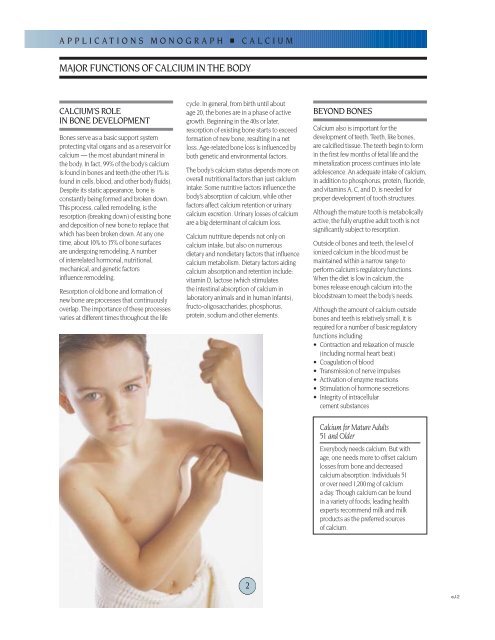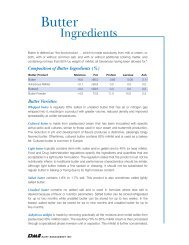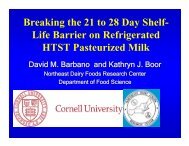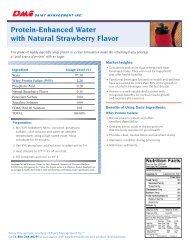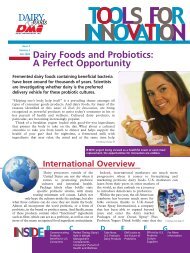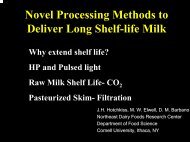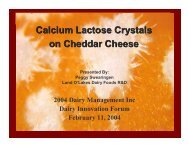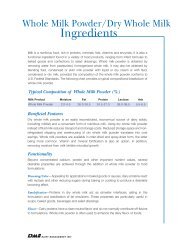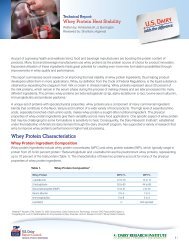Whey products, milk minerals and dairy calcium - InnovateWithDairy ...
Whey products, milk minerals and dairy calcium - InnovateWithDairy ...
Whey products, milk minerals and dairy calcium - InnovateWithDairy ...
You also want an ePaper? Increase the reach of your titles
YUMPU automatically turns print PDFs into web optimized ePapers that Google loves.
APPLICATIONS MONOGRAPH ■ CALCIUMMAJOR FUNCTIONS OF CALCIUM IN THE BODYCALCIUM’S ROLEIN BONE DEVELOPMENTBones serve as a basic support systemprotecting vital organs <strong>and</strong> as a reservoir for<strong>calcium</strong> — the most abundant mineral inthe body. In fact, 99% of the body’s <strong>calcium</strong>is found in bones <strong>and</strong> teeth (the other 1% isfound in cells, blood, <strong>and</strong> other body fluids).Despite its static appearance, bone isconstantly being formed <strong>and</strong> broken down.This process, called remodeling, is theresorption (breaking down) of existing bone<strong>and</strong> deposition of new bone to replace thatwhich has been broken down. At any onetime, about 10% to 15% of bone surfacesare undergoing remodeling. A numberof interrelated hormonal, nutritional,mechanical, <strong>and</strong> genetic factorsinfluence remodeling.Resorption of old bone <strong>and</strong> formation ofnew bone are processes that continuouslyoverlap. The importance of these processesvaries at different times throughout the lifecycle. In general, from birth until aboutage 20, the bones are in a phase of activegrowth. Beginning in the 40s or later,resorption of existing bone starts to exceedformation of new bone, resulting in a netloss. Age-related bone loss is influenced byboth genetic <strong>and</strong> environmental factors.The body’s <strong>calcium</strong> status depends more onoverall nutritional factors than just <strong>calcium</strong>intake. Some nutritive factors influence thebody’s absorption of <strong>calcium</strong>, while otherfactors affect <strong>calcium</strong> retention or urinary<strong>calcium</strong> excretion. Urinary losses of <strong>calcium</strong>are a big determinant of <strong>calcium</strong> loss.Calcium nutriture depends not only on<strong>calcium</strong> intake, but also on numerousdietary <strong>and</strong> nondietary factors that influence<strong>calcium</strong> metabolism. Dietary factors aiding<strong>calcium</strong> absorption <strong>and</strong> retention include:vitamin D, lactose (which stimulatesthe intestinal absorption of <strong>calcium</strong> inlaboratory animals <strong>and</strong> in human infants),fructo-oligosaccharides, phosphorus,protein, sodium <strong>and</strong> other elements.BEYOND BONESCalcium also is important for thedevelopment of teeth. Teeth, like bones,are calcified tissue. The teeth begin to formin the first few months of fetal life <strong>and</strong> themineralization process continues into lateadolescence. An adequate intake of <strong>calcium</strong>,in addition to phosphorus, protein, fluoride,<strong>and</strong> vitamins A, C, <strong>and</strong> D, is needed forproper development of tooth structures.Although the mature tooth is metabolicallyactive, the fully eruptive adult tooth is notsignificantly subject to resorption.Outside of bones <strong>and</strong> teeth, the level ofionized <strong>calcium</strong> in the blood must bemaintained within a narrow range toperform <strong>calcium</strong>’s regulatory functions.When the diet is low in <strong>calcium</strong>, thebones release enough <strong>calcium</strong> into thebloodstream to meet the body’s needs.Although the amount of <strong>calcium</strong> outsidebones <strong>and</strong> teeth is relatively small, it isrequired for a number of basic regulatoryfunctions including:• Contraction <strong>and</strong> relaxation of muscle(including normal heart beat)• Coagulation of blood• Transmission of nerve impulses• Activation of enzyme reactions• Stimulation of hormone secretions• Integrity of intracellularcement substancesCalcium for Mature Adults51 <strong>and</strong> OlderEverybody needs <strong>calcium</strong>. But withage, one needs more to offset <strong>calcium</strong>losses from bone <strong>and</strong> decreased<strong>calcium</strong> absorption. Individuals 51or over need 1,200mg of <strong>calcium</strong>a day. Though <strong>calcium</strong> can be foundin a variety of foods, leading healthexperts recommend <strong>milk</strong> <strong>and</strong> <strong>milk</strong><strong>products</strong> as the preferred sourcesof <strong>calcium</strong>.2eJ.2


